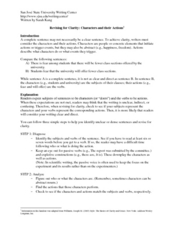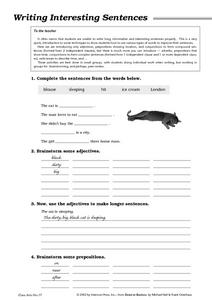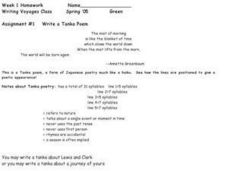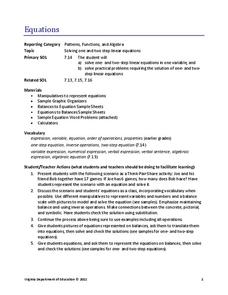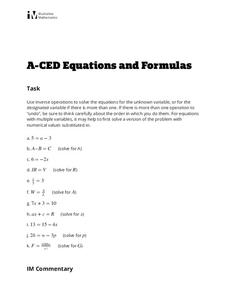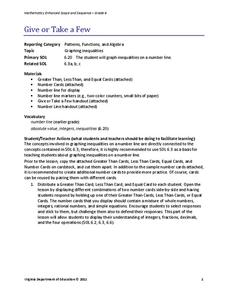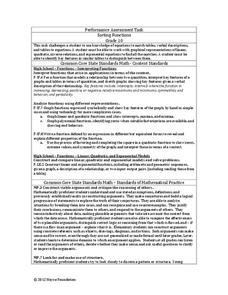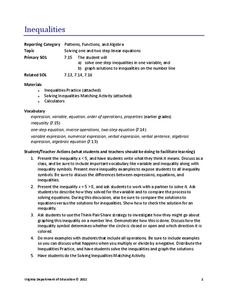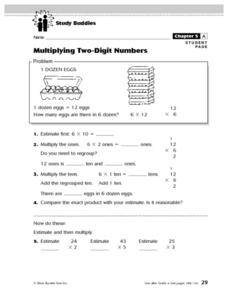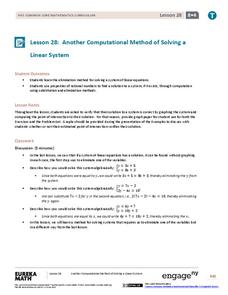San José State University
Revising for Clarity: Characters and Their Actions
This handout offers a three-step process for revising sentences for clarity: diagnose, analyze, revise. After reading an example sentence revision with a detailed explanation, learners complete three sample sentences using the three-step...
Curated OER
Writing Interesting Sentences
Help your class build their own 20-word sentences with this step-by-step guide designed to enhance sentence depth, interest, and variety in the work of young writers. They complete five basic SVO sentences using a given word bank....
Curated OER
Man's Search For Meaning: Writing Assessment (Final Multi-Genre Project)
Conclude a study of Viktor Frankl's Man's Search for Meaning with a research project that asks readers to investigate what various religions and philosophies believe is the meaning of life. The resource packet includes a list of...
Curated OER
Write a Tanka Poem
For this Tanka poem worksheet, 6th graders analyze a Tanka poem for number of syllables and content parameters, then write one about a journey, real or imagined using the 6 step writing process.
Virginia Department of Education
Equations
Science equipment can be handy for math class, too. Scholars learn to solve one- and two-step linear equations by using the concept of a balance. They solve real-world problems in a variety of contexts by writing and solving linear...
Charleston School District
Solving with Inverse Operations
What does order of operations have to do with solving equations? A video explains solving two-step equations using a do/undo chart. Learners recognize the operations within an equation and use inverse operations to undo those...
EngageNY
Creating Division Stories
Create your own adventure story ... well, not really. The fifth lesson in a 21-part series has pairs create story contexts for division problems. The lesson presents a step-by-step process for pupils to follow in writing such stories.
Illustrative Mathematics
Equations and Formulas
Your class is asked to use inverse operations to solve eleven equations for unknown variables or to rearrange formulas to highlight a quantity of interest. By using the same reasoning as solving one- and two-step equations, algebra...
Curated OER
Relate Counting to Addition and Subtraction
Use patterns to practice basic addition; pupils count by two, starting from eight and counting on to 20. They record the five numbers missing from the sequence. Below, the worksheet walks learners through the process...
Virginia Department of Education
Give or Take a Few
Young mathematicians extend their knowledge of rational numbers on a number line to graph inequalities by first using number cards to compare rational numbers. They finish by using similar reasoning to graph inequalities on a number line.
Tech Museum of Innovation
Ant-Man Saves the Day
Provide Ant-Man with a flying device to aid in fighting crime. The first installment of a five-part unit has learners designing and building a flying device for Ant-Man. They write a narrative essay describing the engineering process...
Inside Mathematics
Conference Tables
Pupils analyze a pattern of conference tables to determine the number of tables needed and the number of people that can be seated for a given size. Individuals develop general formulas for the two growing number patterns and...
Inside Mathematics
Sorting Functions
Graph A goes with equation C, but table B. The short assessment task requires class members to match graphs with their corresponding tables, equations, and verbalized rules. Pupils then provide explanations on the process they used to...
Curated OER
Comparing 3 Digit Numbers
Warm up your mathematicians with this comparing numbers activity. Because it includes an explanation, consider projecting this as an all-class activity, covering up the answers until after learner responses have been shared. There are...
EngageNY
Estimating Digits in a Quotient
Boiling down any division problem to a one-digit divisor problem sure makes estimation easy. The lesson shows how to estimate division problems by using place value understanding and basic arithmetic facts to simplify the division. Some...
Virginia Department of Education
Inequalities
Not all resources are created equal — and your class benefits! Scholars learn how to solve one-step inequalities using inverse operations. They complete an activity matching inequalities to their solutions.
EngageNY
Exploiting the Connection to Trigonometry 2
The class checks to see if the formula for finding powers of a complex number works to find the roots too. Pupils review the previous day's work and graph on the polar grid. The discussion leads the class to think about...
Curated OER
Dividing by Larger Numbers
How should the remainder be expressed? Scholars explore multiple ways as they solve 15 long division problems, only four of which divide evenly. For the first eight, they write out the remainders as fractions, while the last eight have...
Curated OER
Using a Computer To Write a Letter- Verbs
In this writing on the computer instructional activity, students study the steps to follow when writing a letter on the computer. Students read 20 sentences and fill in the proper verb from the word bank.
Curated OER
Complex Analysis: Homework Set 5: Domain
In this domain worksheet, students determine the domain of analyticity for given functions. This one-page worksheet contains five multi-step equations.
Curated OER
Study Buddies: Multiplying Two-Digit Numbers
In this math homework worksheet, students will solve a 2 digit multiplication problem with parental support. Students will follow a step-by-step process and "Coach's Notes" are provided for the parent helper.
Curated OER
Adding Fractions
Each of these 20 fraction pairs needs to be totaled, but that's not all there is to do! Scholars find the least common denominator first, then reduce the answer to simplest form if needed. These practice problems are excellent in the...
Virginia Department of Education
Solving Equations
Demonstrate the abstract process of solving equations by using algebra tiles as a concrete representation. Scholars begin by solving equations through the use of manipulatives. As they gain more confidence, they progress to...
EngageNY
Another Computational Model of Solving a Linear System
The process of elimination really works! Use elimination when substitution isn't doing the job. The 29th segment in a series of 33 introduces the elimination method to solving linear systems. Pupils work several exercises to grasp the...


